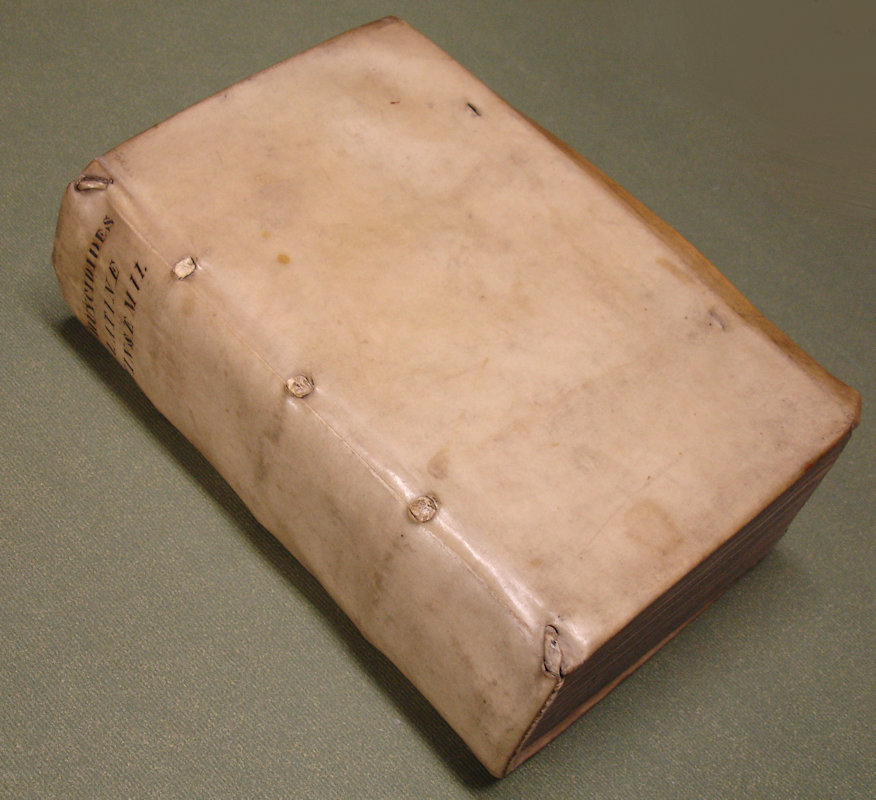THUCYDIDES. Thucydidis Atheniensis Historiae de bello Peloponnesiaco libri octo, e Graeco sermone in Latinam linguam conversi a Vito Winsemio patre, artis medicae Doctore, & Graecae linguae Professore in inclyta Academia Witebergensi. Nunc denuo ad exemplum ab ipso authore ante obitum diligentissime recognitum, recusi & editi.
Wittenberg (Witebergae), 1580.
8vo. (XL),848 p. Overlapping vellum. 18 cm (
Ref: VD16 T 1123; Hoffmann 3,557. Schweiger 1,328; Graesse 6/2,151; Ebert 22947) (
Details: Latin translation only. Short title in ink on the back. Woodcut printer's device of Samuel Selfisch on the title: it depicts Samuel anointing David, behind David lies his harp (Samuel I,16,13); Samuel and David are depicted within a floral festoon, in both upper corners are two putti looking on; at the feet Samuel and David rests a shield with a big
S in its centre. Good quality paper.) (
Condition: Vellum aged and somewhat soiled. All four ties gone) (
Note: The German scholar Vitus Winshemius, 1501-1570, or Veit Winsheim, is called after his hometown Windsheim. His original name was Veit Oertel, or Örtel. He is also known as Herr Vitus Oerthl von Winssheim. The young man went to Wittenberg to study, and soon caught the attention of Melanchthon and Luther. He was given financial support by his hometown with a grant of 20 gold guilders a year. His appointment to professor of Greek at his university followed in 1541, later he became professor of Medecine too. In 1538 Winsemius' teacher Melanchthon, who praised him for his knowledge and modesty, asked him to publish a new revised edition of his Latin Syntax. He later produced mediocre (according to Bursian) translations of several Greek authors. (ADB 43, p. 462/3, also Eckstein p. 621) In 1569 Winsemius published a new Latin translation of Thucydides. Eleven years later it was published for the second time. His son, who's name was also Veit, who was a jurist, and also a professor in Wittenberg, produced an edition which had been revised by his father shortly before he died in 1570. This edition of 1580 has 2 dedications, the first of the son, and the second of the father, both for Augustus, since 1553 Elector of Sachsen (1526-1586). From the dedications we learn the following, that Winsemius produced the translation near the end of his life, 'in mea decrepita senecta'. 'Vixi hic (Wittenberg) annos iam pene 50', he tells the reader elsewhere in his preface. Winsemius filius proudly tells us that his father was closely connected to monarch August (familiariter notus), and that he published the book on his own expense (meoque sumptu atque impensis). Winsemius senior undertook the translation because he was not satisfied with the already existing translations. They were mutilated and too obscure. He calls Thucydides a great historian, and emphasizes that we must learn from the mistakes and successes of the Greek, so eloquently described. However 'et quidem negari non potest, esse multa perplexa atque intellectu difficilia in libris Thucydidis'. This harshness in diction, strange and oldfashioned syntax and vocabulary deter people from reading the great author, he explains. Winsemius filius wanted to honour the memory of his father with this book. He not only took the trouble of publishing the translaton anew, and on his own expense, but he did so with great care. He hired a first class publisher who could take care of printing with clear printing type, and who knew how to produce a pleasant type page. The son ordered also to buy paper of good quality. VD16 says that this publisher was Matthäus Welack, who was active from 1576 till 1593. How VD16 knows this we could not find out. This cannot however be correct. Welack was a busy printer and publisher in Wittemberg, that is true, but the printers' mark on the title is definitely that of the publisher Samuel Selfisch, 1529-1615. Welack's printer's mark also shows a Salomon and David scene) (
Collation: a-b8, c4; A-3G8)(Photographs on request)
Book number: 130011 Euro 625.00
Keywords: (Oude Druk), (Rare Books), Altertum, Altertumswissenschaft, Altphilologie, Antike, Antiquity, Greek history, Greek literature, Griechische Literatur, Latin translation only, Oertel, Selfisch, Thucydides, Thukydides, Welack, Windsheim, Winsemius, Witteberg, Wittemberg, Wittenberg, classical philology, griechische Geschichte, Örtel
 THUCYDIDES.
THUCYDIDES.